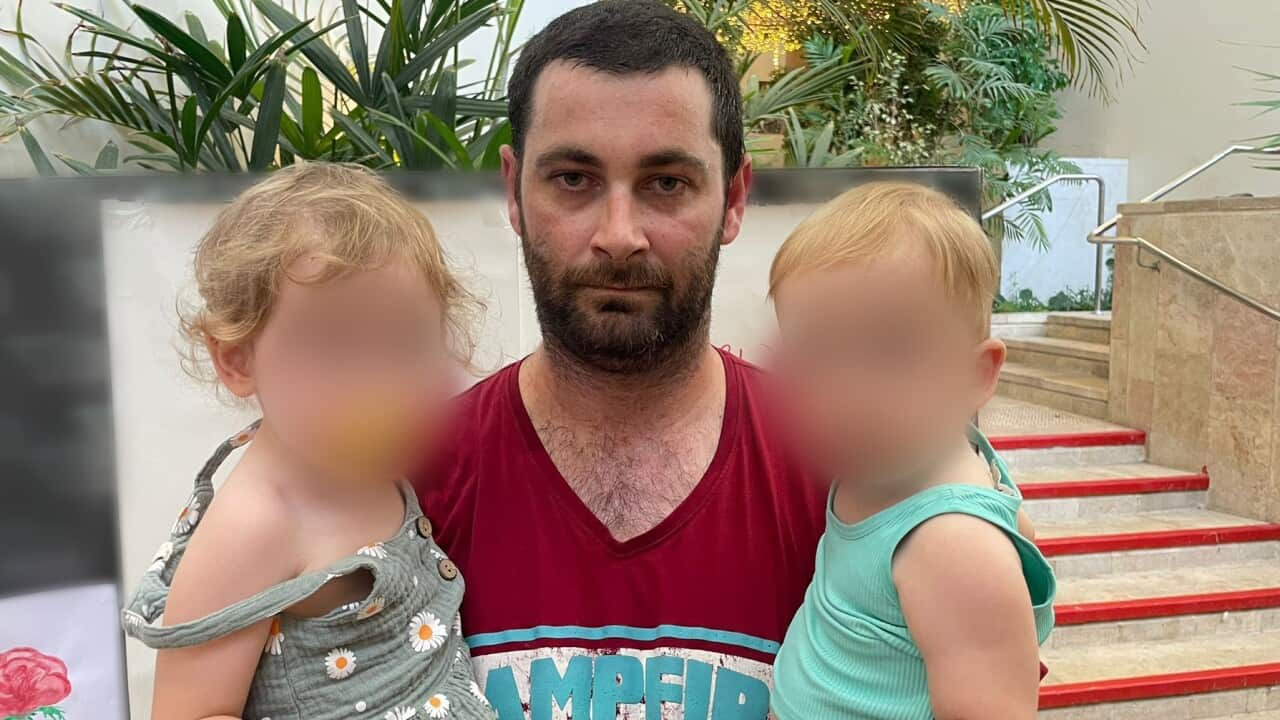This story contains distressing content.
As he hid in a bunker with his family while fighting raged outside, Anthony* feared he might have to do the unimaginable if militants found them: kill his own children.
Anthony, an Australian, along with his Israeli-Australian wife and their three children aged under four lived in Kibbutz Be-eri, a farming community in southern Israel near the Gaza Strip border — and one where 110 bodies were found following the violence that ensued after Hamas .
Israeli-Palestinian rocket fire is not uncommon, and at first, Anthony didn't think much of the sound of explosions as he sat in his backyard.
But as alarms rang out, the sound of gunfire drew nearer and became more rapid, and rockets began to fall on the kibbutz, he knew they had to move.
"I yelled out to my wife to grab the kids and get in the bunker," Anthony said.
"I said to my wife ... this isn't the usual rocket attack, we've got to sit in here and try to keep the kids quiet."
Anthony said they were holed up there for 12 hours, with few supplies and little means to defend themselves beyond the "couple of big knives" they had in the room.
And he thought he would have to make an impossible decision if Hamas fighters found them.
"The only thing going through my mind was, 'If they come in here, I'm going to have to kill my kids myself'," Anthony said, his voice breaking.
"I didn't want my kids to become prisoners, so I thought I was going to have to kill my kids."

An Israeli soldier walks past a house destroyed by Hamas militants in Kibbutz Be'eri on on Wednesday. Source: AAP, AP / Baz Ratner
Hamas , gaining power in the Gaza Strip since winning legislative elections there in 2006.
Hamas' stated aim is to establish a Palestinian state, while refusing to recognise Israel's right to exist.

Israeli soldiers carry the body of a Hamas militant in Kibbutz Be'eri on Wednesday. Source: AAP, AP / Baz Ratner
"My heart goes out to the families that have lost so much," he said. "We were so lucky, all our kids were alive."
Photos taken at the kibbutz, which is home to about 1,000 people, on Wednesday showed burnt-out and razed homes, damaged vehicles, and body bags.
The bodies of 110 Israeli civilians have been identified so far, according to media reports, as well as those of 103 militants.

A member of Israeli security forces inspects a damaged building at Kibbutz Be-eri on Wednesday. Source: Getty, AFP / Jack Guez
At least 1,300 Israelis have been killed, while 1,200 people have been killed in Gaza since Saturday. Thousands of people on both sides have been injured.
Israel has put Gaza under "total siege" to , many poor and dependent on aid. Hamas media said on Wednesday electricity went out after the only power station stopped working.
It has also deployed formations of tanks and armoured vehicles near Gaza in possible preparation for a ground offensive into the Hamas-ruled coastal enclave.
Australia has , with one in Sydney on Monday having sparked controversy after a small group of protesters .
Academic Fahad Ali, one of the organisers of the Sydney protest, despite Premier Chris Minns insisting it would not go ahead.
"The community has a right to protest military occupation … by Israel," Ali told SBS News on Wednesday.
"Why is it that only some people get to mourn and not others — why is it that we cannot mourn our families, our friends, our colleagues?
"I think it's easy to see that this is a targeted political campaign to silence dissent. It has grave implications for civil liberties."
Hamas, in its entirety, is designated as a terrorist organisation by countries including Australia, Canada, the United Kingdom and the United States.
Some countries list only its military wing as a terrorist group.
The United Nations though did not condemn Hamas in its entirety as a terrorist organisation, due to insufficient support from member states to do so during a 2018 vote.
- With Reuters.
*Last name has been omitted for privacy reasons. Since speaking with Anthony, SBS News has been in touch to check in on his welfare.


